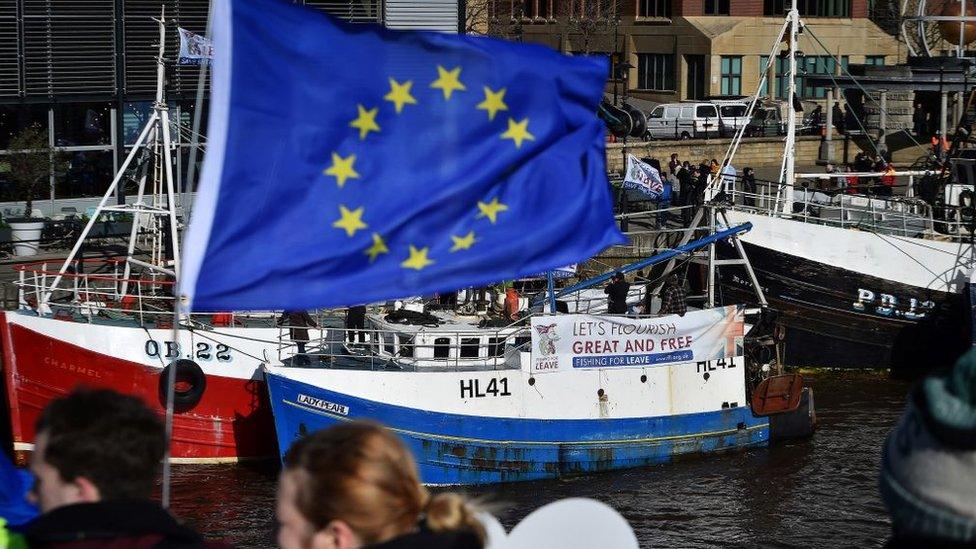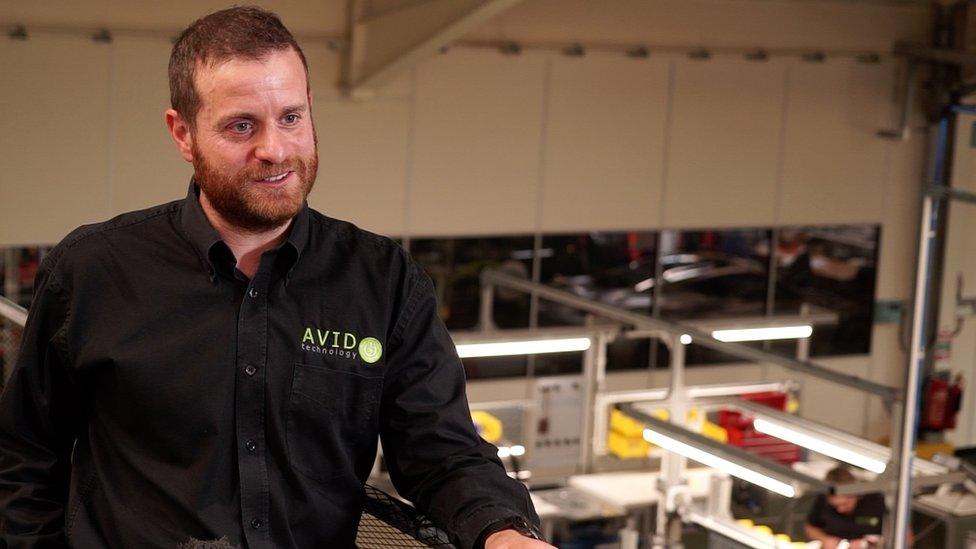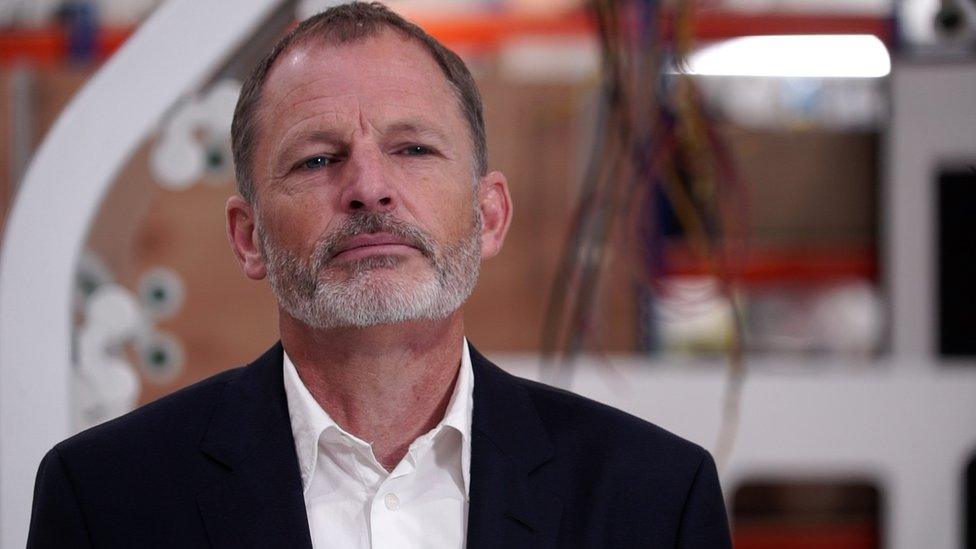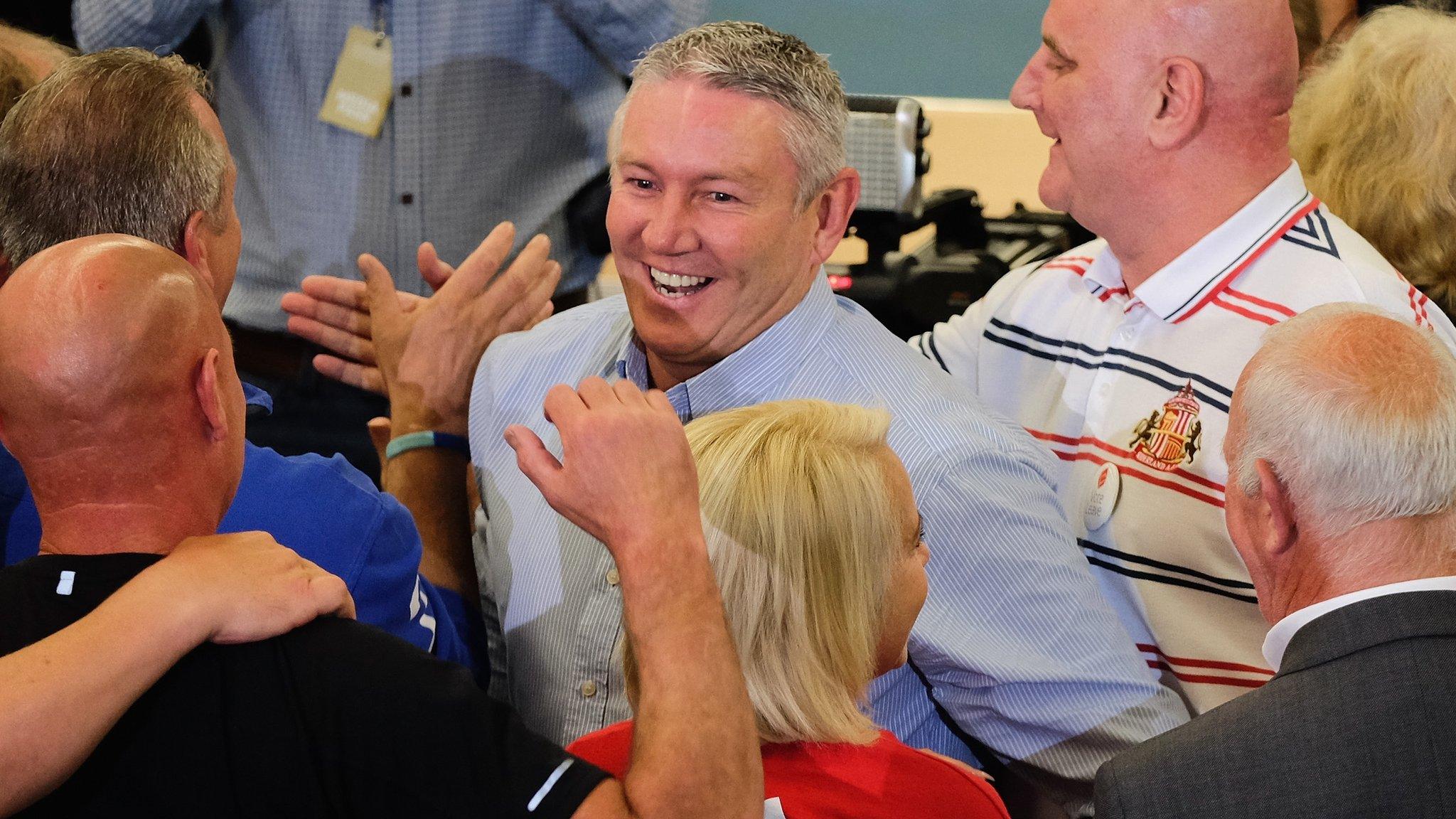The battered North East firms not ready for Brexit
- Published

Brexit protests on the the River Tyne in Newcastle
At any other time the prospect of the biggest change in the UK's trading arrangements with its biggest economic partner would dominate the thinking of almost every business.
But Covid-ravaged firms who have been in a fight for survival for the last six months have found it hard to find the time, money or bandwidth to give much thought to Brexit.
Although the UK left the EU in January, it's business as usual until 31 December when the transition period ends and the reality of Brexit becomes apparent.
With just 98 days to go until then, a new survey from the British Chambers of Commerce has found that half of UK firms that trade internationally have not analysed the impact Brexit may have on their business.
'I hadn't thought about it'
Nick Hart from Hart Door systems in Newcastle confesses that he is one of them.
"To be totally honest, before you called me, I hadn't really thought about it. We don't do a lot of trade directly with the EU but a lot of my customers in the UK do. The big unknown is how much it will affect them and in turn how that will affect us," he told me.
One of his biggest customers is Nissan, which employs 7,000 people directly at its plant in Sunderland. And that supports tens of thousands more in the supply chain. Nissan exports more than 50% of the cars it makes in the North East to the EU. The Japanese firm has repeatedly warned that if the UK and the EU fail to strike a trade deal, the 10% tariff the EU imposes on all cars made anywhere outside the bloc could threaten the plant's future.
Not far down the road, Ryan Maughan runs Avid Technology, which supplies components for electrical vehicles and relies on the EU for two thirds of its orders. If there is no deal he would reluctantly have to move a significant amount of production to the EU. He says the stress of that - on top of surviving Covid - has been immense.

"Covid has been a nightmare - all consuming. And now we've somehow got to find the extra time and resources to plan for Brexit. The stress for me is that I know I should be doing something to get ready, but I don't know what that is. I love the North East I want my business to stay here but if there's a bad deal or no deal that involves tariffs, I will have to move some of the operations to mainland Europe."
The North East is the part of the UK that is most reliant on EU exports. Nowhere else does the amount it sells to Europe exceed what it buys from Europe to such a degree. Nowhere else then has potentially more to lose from a failure to reach a deal.
However, the North East is also a prime candidate for the kind of direct investment the government wants to make in the regions as part of its "levelling up" agenda, without any interference or permission needed from Brussels. One of the biggest stumbling blocks to securing a deal is a row over "state aid".
The EU doesn't want UK government-backed companies enjoying a competitive advantage. If the UK wants tariff-free access to EU markets, it must play on a level playing field.
The irony here is that EU governments spend far more on supporting the private sector than the UK has ever done. But Newcastle-based lawyer Alex Rose, a specialist in state-aid law, said that while the UK could do most of the things it says it wants to do under the current EU guidelines, if you are leaving, you might as well get to write your own rules.
"There is a really good opportunity here to create a Rolls-Royce state aid regime that will allow us to fund our priorities," he said. "Those priorities might be environmental, they might be 'levelling up' - creating jobs in areas that have been economically underperforming. Ultimately, politically the referendum result seems to require a UK-specific state aid regime."
Brian Palmer owns Tharsus Robotics, which makes high-tech equipment for Ocado - among others - and has just sealed a major contract with BMW. He says that is proof that UK companies can compete come what may - and agrees that state aid can help if done right.

"Well-targeted state aid can really help growing businesses be brave, make investment decisions ahead of time and really stretch themselves. So, if the government has a really clear policy and uses state aid wisely, I think that can be of benefit, but it cannot be at the risk of the reputation of the country as a trading nation," he said.
But to others it's a strange altar on which to sacrifice a trade deal. Why scupper a deal that almost all businesses say they want for the freedom to do something the UK has historically rarely done?
Fighting for survival
Talks are still ongoing and both the EU and UK say they want a deal but progress is hard to discern. The chances of a no-deal Brexit have arguably never been higher.
Battered bruised and fighting for survival, are businesses ready for a deeply uncertain three months ahead?
Not according to Richard Swart from Berger Closures - another North East-based company enjoying success in a manufacturing niche - supplying the seals that keep the lids on drums and barrels. And 25% of those seals are sold to the EU.
"It's been an incredibly strange and depressing six months with the focus on survival which has pushed Brexit right down the list of priorities," he said.
But, surely business has had ample time before Covid struck to prepare for a range of Brexit outcomes. Why complain when there is 98 days to go? You hope for the best but prepare for the worst - right?
"We have talked to our customers and they have made it very clear that we must bear any additional costs of a no-deal. Remember in this case it is the government who has created the uncertainty," he said.
The British Chambers of Commerce agrees to an extent, saying there is a limit to what business can do when there are so many basic unanswered questions. What labelling will UK food and drink of EU export require? How will foreign-sourced components in UK-finished goods be treated? How will development funds that used to come from the EU be replaced? These and other mind, money, and time-draining issues are something the government could help with.
The BCC says the government's campaign encouraging business to 'Check, Change, Go' gives the impression that Brexit preparation is like getting an MOT - whereas the reality is that for many businesses, it's "more akin to planning a moon landing".
Mission control has other problems on its mind right now.
- Published24 June 2016

